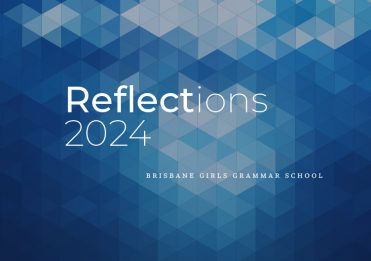Gala—Luminescence
Sunday 14 August saw the culmination of the much-anticipated BGGS Luminescence concert in the Great Hall of the Brisbane Convention and Exhibition Centre (BCEC). The afternoon concert was a dazzling presentation of all that is wonderful in our BGGS musical community. The bringing together of hundreds of students, scores of BGGS staff, audio-visual professionals, and an enormous venue was a triumphant success. Under the intense pressure of our first live Gala event in three years, all involved rose to the occasion, delivering what will be remembered as one of the most dynamically electrifying Gala presentations to date.
All students are congratulated on their efforts and musicianship that contributed to the success of Gala—Luminescence. Rebuilding the BGGS fine tradition of live Gala events, following what we hope is the worst of the pandemic, is clearly an effort worth making for the betterment of our school community.
Our Instrumental Music staff delivered a Herculean effort to bring this production to life and we are deeply appreciative of all involved. We are very fortunate to have a team of staff in Facilities, Communications and Events, Academic Staff, and beyond, who provide invaluable support consistently throughout the year—but, acutely at Gala time. We thank you all for your expertise, corporate knowledge, creativity, support, and general assistance and attendance on the day.
Below are some snapshots of the Gala. A professional audio-visual recording is being compiled and we will advise you in due course when this will be available.
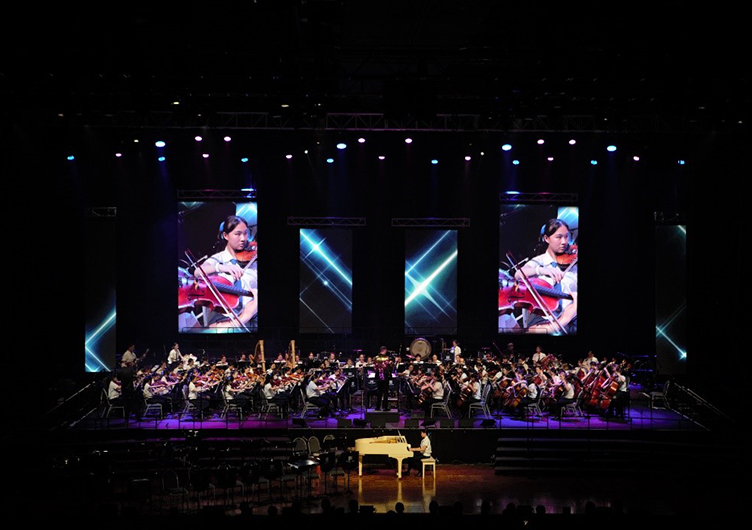
Symphony Orchestra at Gala—Luminescence
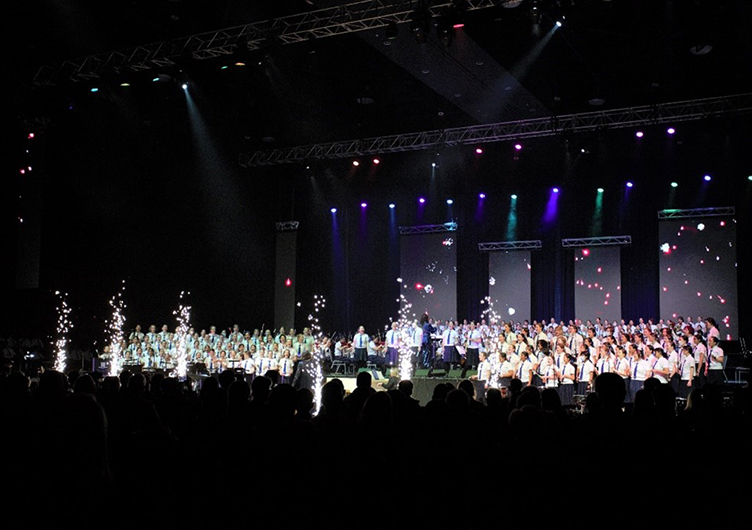
Massed Group Finale at Gala—Luminescence
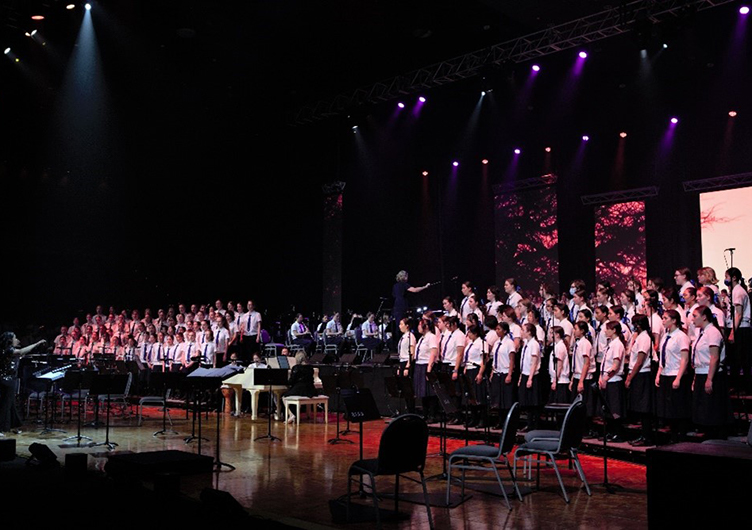
Massed Treble Choir with Symphonic Winds at Gala—Luminescence
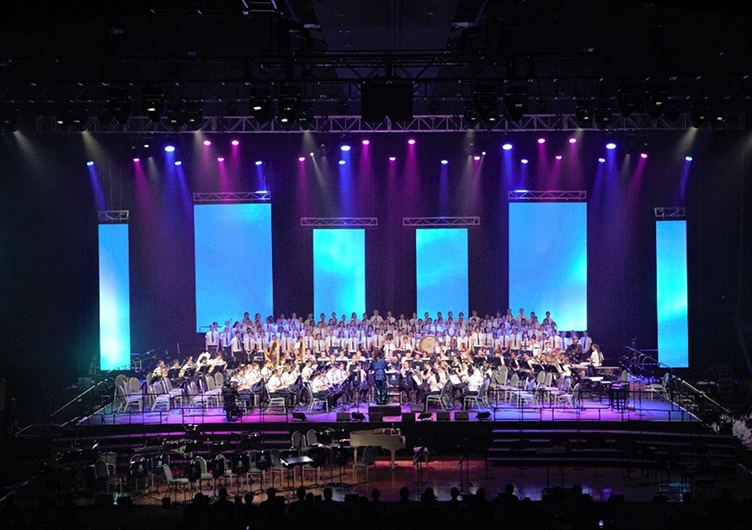
Symphonic Winds at Gala—Luminescence
Gillies Ensemble Prize
On Friday 12 August, our annual Gillies Vocal Prize was held with adjudicator, Julie Christiansen OAM. Mrs Christiansen is the founder of the choral organisation, Voices of Birralee, and she was awarded the Medal of the Order of Australia for her contribution to the choral community, particularly in connection with children’s choirs.
We had groups competing from Years 8 to 12, all of whom were congratulated by our adjudicator for being well-prepared. Seven groups were awarded a highly commended (listed below), with our winning group performing the Judy Garland classic, Somewhere Over the Rainbow, and the hit Queen song Somebody to Love.
Highly Commended:
Year 9
- Orli Wachtel (9B), Emily Fletcher (9M), Elodi Hsu (9M)
- Alisha Yu (9E), Eloise Turkovic (9E), Eileen Tseng (9H)
Year 10 and 11
- Dorothy Rae (10G), Tessa Lloyd (10O), Alyssa Godinho (10B), Ruby Logan (10R)
- Scout Sommerfeld (10L), Victoria Morrison (11R), Wenke (Levi) Gao (10G)
- Vivian Lee (11O), Yi-Shiuan (Vicki) Chuang (11E), Sarah Young (11H)
Year 12
- Caitlin Brough (12W), Lucianna Yu (12E), Julia Guo (12H), Ingrid Liu (12H)
- Schuyler Mills (12E), Charlotte Callinan (12H), Jessie Lu (12G), Maxine Gamer (12G)
First Prize
Year 12
- Sally Grice (12E), Sophia Carroll (12L), Isabel Shorrock-Browne (12R), Sofia Cirino (12O)
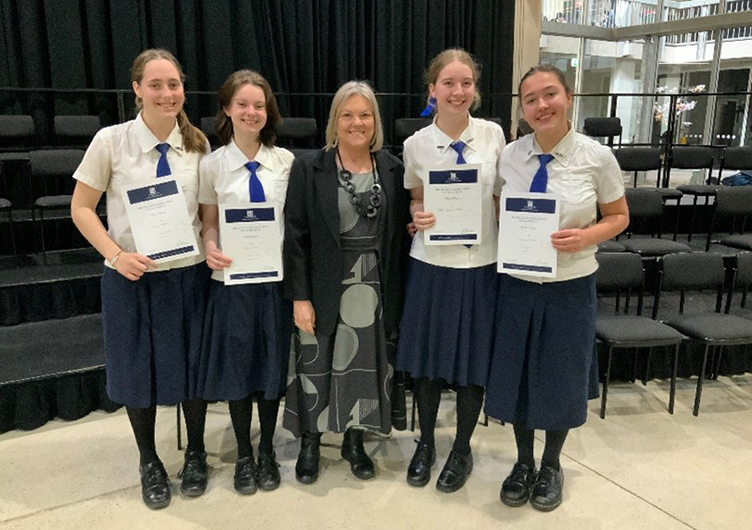
Gillies Chamber Music—Vocal Division winners: Sally Grice (12E), Sophia Carroll (12L), Isabel Shorrock-Browne (12R), and Sofia Cirino (12O), with adjudicator Julie Christiansen OAM
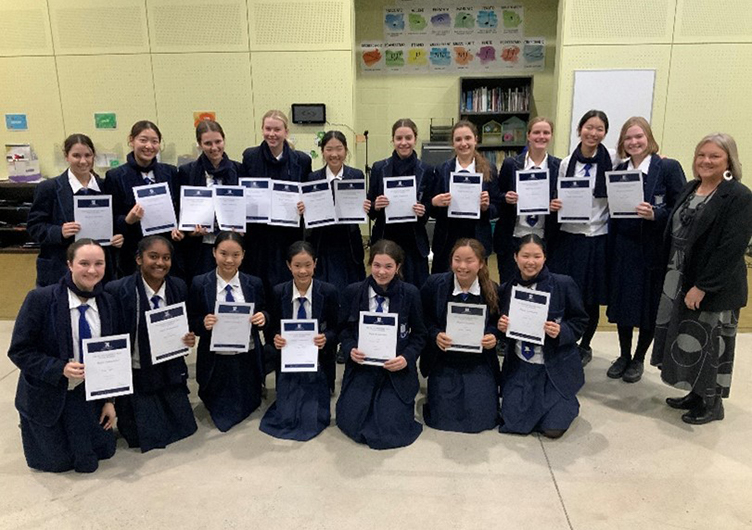
Gillies Chamber Music—Vocal Division Highly Commended groups with adjudicator, Julie Christiansen OAM
Vivaldi service performance
Did you know that the cuckoo is onomatopoeic, which means that its name is taken from the bird’s call?
Vivaldi Strings have learned how to both sing and play this ‘cu-ckoo’ call and have been working on a collection of repertoires about animals in preparation for their visit to Red Hill Special School this week. They worked together with Ms Pollicina on this ‘animal’ themed program to engage actively with their diverse audience. In their performance, the students from Red Hill Special School were able to:
- guess what kind of animal might make a ‘cu-ckoo’ sound, explaining with their very own communication systems
- experience different sounds in the orchestra with the addition of mutes, tremolo, and a piano
- walk through the orchestra with an illuminated path to watch the girls play Saint-Saen’s Aquarium and admire their crafted ‘aquarium’ adorned on each stand
- move and dance to joyful music
- join in with the orchestra as a ‘Guest Soloist’—a piece where the guest plays the solo on their very own violin.
Much fun was had by all, and the joy experienced by the students from Red Hill Special School was uplifting.
Brisbane Girls Grammar School has a long tradition of Service, with our girls encouraged to become active citizens and to engage meaningfully with their communities. With students ranging from Years 7 to 12 in Vivaldi Strings, this was a wonderful opportunity to share our music and work within the broader community.
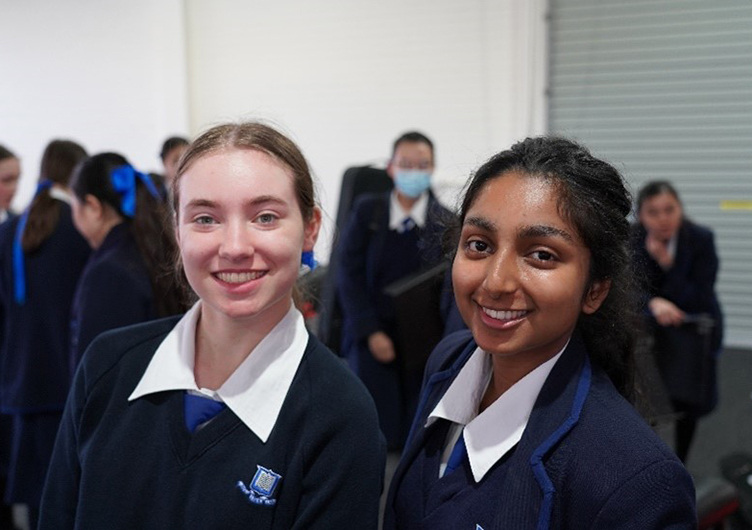
Josephine Davis (11L) and Thenuri Basnayake (11H)
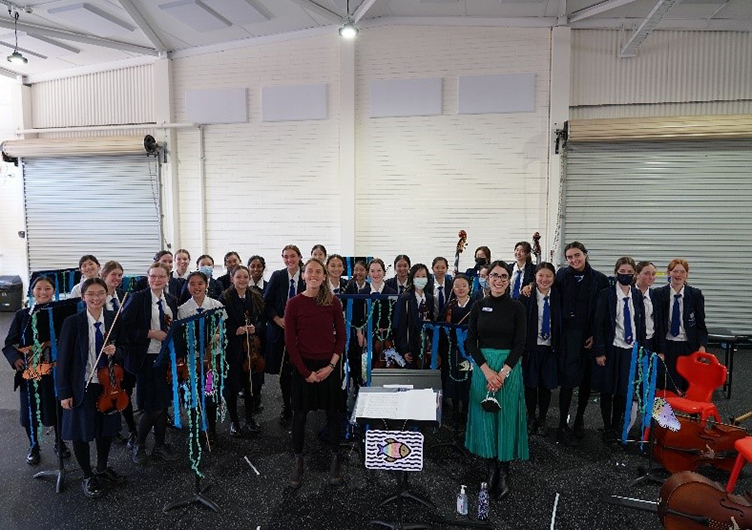
Vivaldi Strings with Red Hill Special School Music Teacher, Ms Kathryn Robinson
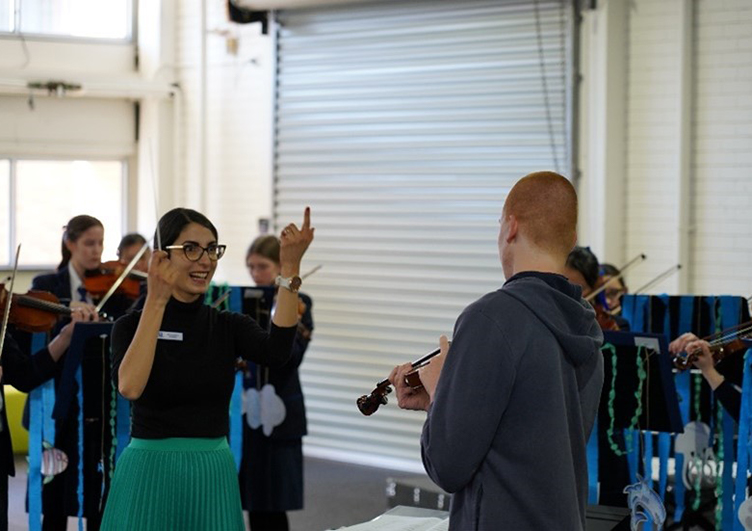
Miss Pollicina helping a student at Red Hill Special School play Violin for the first time
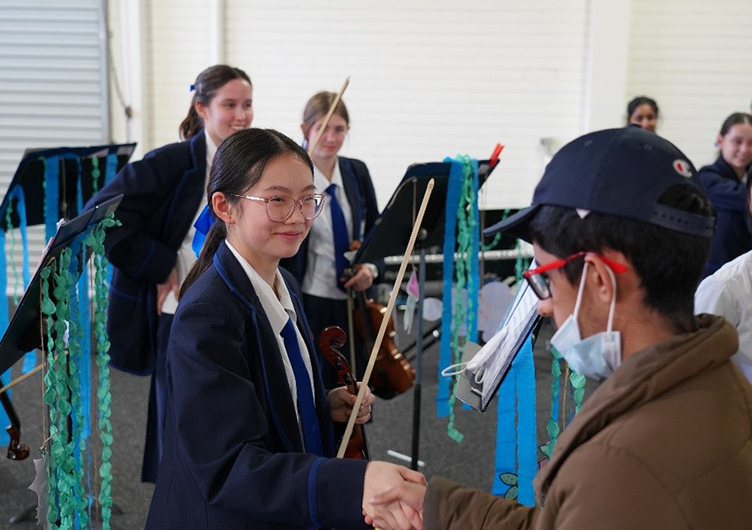
Olivia Banh (9E) greeting one of the students from Red Hill Special School
QYO Mahler Concert
On Saturday 27 August, Queensland Youth Symphony (QYS) will be holding its final concert of the year at QPAC. QYS will be performing Mahler’s Symphony No. 3, featuring Mezzo-soprano Deborah Humble, the Brisbane Chorale Women’s Choir, and QYO Children’s Choir. Some of our Grammar girls will also feature in this concert. Tickets can be purchased here.

From the teaching studio
This week, we stopped by Ms Porter’s teaching studio to talk to some of our youngest Flute players at BGGS—Sofia Lauder (7W) and Chloe McCullen (7E). Ms Porter is one of our woodwind teachers and also Coordinator of Bands (Acting) this year. She has a unique insight into the inner workings of the Band Department and how it operates within the broader structure of the Instrumental Music Department.
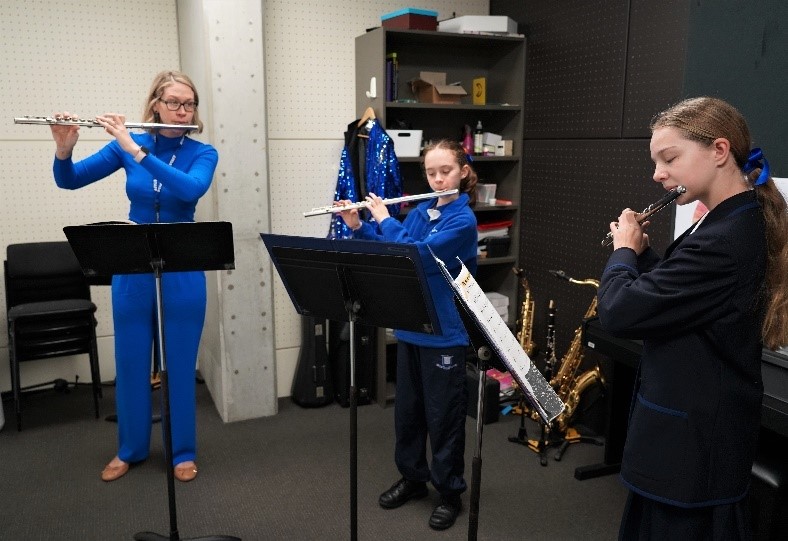
Ms Porter working with Sofia Lauder (7W) and Chloe McCullen (7E) in their lesson this week
We asked Sofia and Chloe a few questions about their initial impressions of Instrumental Music at BGGS.
How does Ms Porter challenge you in lessons and what do you appreciate about this?
Sofia—‘I love having Ms Porter as my Flute teacher as she gives us feedback, goals, and challenges to overcome. I appreciate this, as it makes us want to try even harder and gives us the persistence to know that we won’t always get everything the first time, but if we keep practicing, we can do it.’
Chloe—‘Ms Porter challenges me in lessons by always providing new pieces to work on and showing us how we can get better technique and increase our speed while doing scales. I appreciate this, as it helps me to improve my playing and it gives me a challenge.’
What do you enjoy most about playing Flute at BGGS?
Sofia—‘I love to play Flute at BGGS because in most pieces, Flutes have the melody which I think is interesting and fun to play, and I just find that BGGS is a really fun environment to grow and develop as a musician.’
Chloe—‘All of the fun activities and performances we get to take part in as well as spending time with my friends in my lessons.’
If you could add one thing to the Instrumental Music program at BGGS, what would it be?
Sofia—‘To do lessons with other instruments, because it would be interesting to really hear each other’s sound and the similarities and differences between how your instruments sound.’
Chloe – ‘I would perhaps ask if students could have the opportunity to be able to choose a piece of music to play in their lessons or band as it may provide responsibility and more fun to playing music at BGGS.’
We also asked Ms Porter to reflect on her teaching and learning within the Instrumental Music Department at BGGS.
As Coordinator of Bands, you oversee the implementation of the Instrumental Music curriculum and the operational activities of all ensembles in the Band Department. What do you see as the greatest opportunities for BGGS students who participate in the Bands at BGGS?
Ms Porter—‘I see the opportunities to meet students from outside their House Group and to befriend students in different Year levels as a wonderful experience. The students have access to excellent rehearsal facilities and the opportunity to work with highly knowledgeable teachers/conductors at the School. Also, students have opportunities to learn from world-class conductors and musicians (Conductor in Residence, Brian Balmages, and Prossima Program with the Queensland Symphony Orchestra).
Your teaching role requires you to teach multiple woodwind instruments within the School. What do you find most challenging and what do you find the most fun about this? Do you find the challenging and fun elements of your position overlap in any way?
Ms Porter – ‘The challenge is to be able to consistently model a good tone and intonation on all these instruments. This is particularly hard when you don’t get the time to practice them as regularly as you would like to. It is exciting to learn multiple instruments and to understand the pedagogy behind them. I really enjoy discovering new ways to teach different concepts/techniques.
What do you find most rewarding about our young students progressing through the ensemble structure over their years at BGGS?
Ms Porter—‘Watching students’ growth is always enjoyable. I particularly like seeing students reach that point where they are able to overcome nerves and show their own expression and musicality. As they progress, they explore their own musical pathways and audition for QYO or the Young Conservatorium Program. I think the ensemble structure at BGGS prepares student well for this.
What motivates us to learn in Instrumental Music
Instrumental Music is a challenging pursuit that is implemented over a long timeframe. So, it is not unusual for a young person to experience periods of time where their motivation can subside. This is normal and not usually a cause for concern. Naturally, we would all like for our young people to be self-motivated and engaged at all times, but this is not always a realistic expectation, especially considering the ever-changing world in which our young people are currently living. Distractions, choices, attractions, options, and activities abound, and we may feel the need to offer our young people as many opportunities as possible.
We sometimes chase the ideal that our young people will ‘find’ the pursuit that fills them with fire, and they will want to participate in the activity with little influence or coercion on our part. It is true that some young people find this early, but they are usually in the minority, with some students even getting through a large portion of their schooling without knowing exactly what they ‘love’ to do.
Instrumental Music is a unique pursuit in as much as it offers continual and evolving challenges that some students relish and others can, periodically, find frustrating. It is important to understand, however, that Instrumental Music students are constantly on a continuum of development.
We want our students ‘to have fun’ and that usually motivates them to maintain their engagement with Instrumental Music. It is a generally held belief in music teaching circles that students have fun when they experience success. Success, as we all know, takes work. And therein lies the potential conundrum for some Instrumental Music students—they need to work (sometimes very hard) to experience fun. But that is where the continuum begins and ends.
An excellent quote related to music performance is:
If you practise more, you get better.
If you get better, you play with better players.
If you play with better players, you play better music.
If you play better music, you have more fun.
If you have fun, you want to practise more.
If you practise more, you get better …
Practise is what connects the continuum and keeps it revolving. If there is an interruption to this continuum, it usually happens with practise. Sometimes this can’t be avoided—for example, if a student is quite ill, they can’t physically practise their instrument—although there are alternatives. Therefore, re-joining the continuum is vital once the student is feeling better. The challenge experienced by many young people is that this continuum takes place over the course of many months or years—not days or weeks—and progress can be difficult to notice.
Students are often asked to reflect at the end of each Semester back to the beginning of the Semester or year and think about what they can do now that they couldn’t do back then. Students regularly surprise themselves about what they have achieved over time and that they didn’t recognise the improvement from week to week.
Therefore, if we want our young people to have fun, what we are really saying is we want them to have success, which means they need to work through challenges. It could be argued that when we are faced with a choice between a difficult option and an easier option, we will almost always take the easier option unless there is an obvious and tangible enticement for tackling the more difficult choice (physical reward, higher mark, etc). Naturally, there are exceptions to this, and some will see an intrinsic benefit/motivator (improved self-esteem, confidence, self-satisfaction, etc) to the challenging choice.
Once the above continuum is established, though, it becomes a self-fulfilling prophecy and motivation becomes a side-effect of the student’s success. Of course, we could replace ‘Instrumental Music’ with just about any other life pursuit and this information holds true—which is why music study can have life-long benefits to a person even if they don’t follow a musical path throughout their lives.
MSG News
We congratulate the music staff and students on a fantastic Gala concert last Sunday! It was wonderful to have a live Gala for the first time in three years and it certainly didn’t disappoint. Thanks also to those volunteers who stayed back to help pack up after the event.
Our next meeting is Wednesday 24 August at 6 pm in the Choir Room. All music parents are invited to join us as we fine-tune plans for our Soirée on 8 October. If you can’t join us in person, the Zoom link is: https://bggs-qld-edu-au.zoom.us/j/94230506864.
And please remember to mark your diaries for our inaugural Soirée on 8 October!

Looking Ahead
- Music Support Group Meeting—Wednesday 24 August, 6 pm
- Percussionista Collective Festival—Sunday 21 August
- Junior Strings Festival—Tuesday 6 and Wednesday 7 September
- Music Parents Soiree—Saturday 8 October



